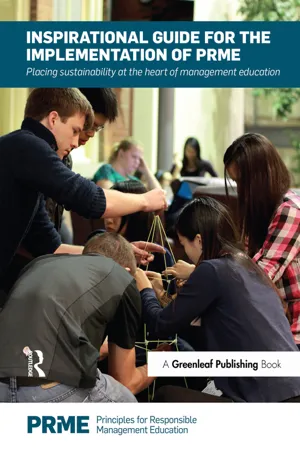![]()
Section 1. Strategy and Change: Fostering a Sustainability Culture Centred on Prme
Introduction
The Principles for Responsible Management Education (PRME) initiative emerged at a time when management schools had started looking for new horizons and paradigms to adapt management education to meet the complex demands of the 21st century global economy.
The combination of two factors – the timely inception of PRME and the traction generated by the initiative itself – help to explain the most important evidence gathered in this Guide: Change is already happening, and many management schools are already "walking the talk" of sustainability. In fact, there are so many examples in this publication that the evidence should not be taken as merely anecdotal.
While this progress is robust, it takes many shapes and forms. Indeed, the variety of experiences is vast. However, patterns can be ascertained in the first "moment" of implementation. As featured in this section, when the decision to adopt sustainability as a core tenet of a management school is taken, it triggers changes at all levels of the organisation. The case stories herein demonstrate that the obstacles to embracing PRME are related not as much to the adoption of the Principles, but more to the integration of new ideas into the education process.
By the launch of PRME in 2007, corporate social responsibility and sustainability concerns, as growing international trends in the corporate world, had already won the battle of ideas, and many management schools were becoming acquainted with these values. In some instances, related values were already part of the mission of the school, while others had a longstanding tradition of employing a humanistic approach to education. These approaches were immediately transferable to the new global paradigm.
The problem was (and is), rather, how to upgrade those values so that they become central drivers of the activities of the school. The case stories in this section elaborate several inspiring practices, which are noted in the following paragraphs.
"Making the implicit explicit" is probably the most important element. A first lesson to be learnt from this section is that it is not enough to simply include the Principles, or similar aspirations, in the mission and vision of the school. This can be an initial advantage, but there is a long stretch between this "theoretical" recognition and the implementation of the Principles in a consistent way at all levels, including curriculum, research efforts, methodological approaches and organisational culture. Transforming the "implicit" values into "explicit" practices requires an altogether new emphasis – a refocusing of priorities, an effective buy in by all actors, and analysis of required organisational change.
The Principles of the PRME initiative are usually first accepted by a few actors, and there are some telling examples on how to transform that initial limited acceptance into an active consensus and approval of the Principles as drivers for action by all internal stakeholders: administrators, faculty and students. Here, the use of top-down and bottom-up approaches, through both formal and informal strategies, can be effective.
Very little progress is achieved without tine conviction on the part of the leadership of the school, which has the crucial role of turning a theoretical acceptance of the Principles into a driver for organisational and educational change. This is because the adaptation of a management school to place sustainability at the core of its teaching, research, pedagogy and culture cannot be achieved without a systemic approach. And, therefore, the need for new structures, incentives and funding cannot be provided without decisions taken by leadership. Thus, a top-down strategy is of critical importance.
However, it is equally important to achieve active buy in from faculty, which is a complex undertaking. The overriding element, as shown in some cases, is to present and treat PRME as an inclusive and voluntary initiative and to establish a strategy of voluntary and incremental buy in by drawing on the capabilities and work of faculty leaders. One of the most inspiring strategies for this increased acceptance by faculty is to couple sustainability with related concepts and trends in management education that are already accepted, such as innovation or social entrepreneurship.
Students are another very important part of the equation. Provided that progress along the path of sustainability is based on a systemic approach, unleashing the potential of students is essential. There are many amazing examples, and several case stories in this section highlight students as the main initiators of very relevant transformative processes towards integration of sustainability in their schools.
According to the case stories, many schools are intent on achieving a specific mode of curriculum change. Although this is a gradual process, the overall approach to holistic curriculum change is not by "adding on" courses (e.g., the introduction of some isolated electives), but by embedding sustainability approaches in all disciplines.
Finally, a clear outcome of the cases featured in this section is that the implementation of PRME inspires not only curriculum change and new horizons for research, but also the transformation of the organisational culture, aligning the values and concepts that are taught and researched with the actions of the institution itself.
Among all the case stories, the effect of PRME on the strategy and activities of management schools can be seen in key strategic dimensions, such as:
- Change towards sustainability in many management schools is already happening, and many schools are already walking the talk.
- The obstacles to embrace PRME are not with accepting the Principles, but in implementing them.
- Transforming the implicit values into explicit practices requires an altogether new emphasis-a refocusing of priorities, an effective buy in by all actors, and analysis of required organisational change.
- Using top-down and bottom-up approaches, through both formal and informal strategies is important.
- The role of the leadership of the school in turning a theoretical acceptance of the Principles into a driver for organisational and educational change is crucial.
- It is important to achieve active buy in from faculty, which is a complex undertaking.
- One strategy for increasing acceptance of sustainability concerns by faculty is to couple sustainability with related concepts and trends in management education that are already accepted, e.g., innovation or social entrepreneurship.
- Students are a very important part of the equation; unleashing their potential is essential.
- The overall approach to holistic curriculum change is by embedding sustainability approaches in all disciplines.
- Implementation of PRME also inspires the transformation of the organisational culture of the institution itself.
![]()
The Buying in Argument: How Prme can be used to Enhance Competitive Advantage
Australian School of Business, University of New South Wales, Sydney, Australia
Making the Implicit Explicit
Introduction
Consistently ranked among the top business schools in Australia, the Australian School of Business (ASB) at the University of New South Wales is located in Sydney, Australia. Boasting over 57,000 alumni, the ASB is host to the Australian Graduate School of Management (AGSM) and 8 disciplinary schools (Accounting, Economics, Banking & Finance, Information Systems, Marketing, Management, Risk & Actuarial, and Taxation & Business Law), 12 research centres and institutions, 9 affiliated research centres, 13,948 students (undergraduate and postgraduate), 260 academics and researchers, and 177 professional and technical staff.
Challenges
As the title of this case study suggests, often the largest challenge of any institution is simply communicating its values effectively. The ASB seeks like-minded and strategic partnerships that provide opportunity for meaningful interaction, and the Principles for Responsible Management Education (PRME) initiative provides for such a partnership. We recognise that our ongoing challenge is to build on the momentum created by our PRME affiliation and constantly aim to apply principles of sustainability, ethics and social responsibility across all of ASB’s learning and teaching responsibilities, thus making the implicit principles much more explicit.
Increasingly, managers and future professionals are challenged to reconsider how value is created – both tangible value and intangible value, and how it can be valued by markets. The concept of risk management, including human capital risk management, has never been more important to corporations and to society. The Principles for Responsible Management Education are entirely consistent with the United Nations-supported Principles for Responsible Investment, both of which form a cornerstone of our teaching and learning. Together, they help us to frame our learning journey for our students, challenging them to reconsider questions about value, risk and sustainability, in order to give them the skills and confidence to challenge the status quo in their professional business lives.
Dr Loretta O’Donnell, Associate Dean (Education), Australian School of Business, University of New South Wales
Actions taken
Beginning in January 2011, we held undergraduate student orientation workshops that highlighted PRME as part of the “first-year experience”. Our PRME affiliation was directly linked to the ASB “graduate attribute” (i.e., qualities and skills we expect our students to develop by the end of their degree) of “social, ethical and global perspectives”.
From 2012, ASB’s PRME membership and engagement will be incorporated into our partnership listings as well as marketing materials for undergraduates and postgraduates. Our partners in educational programs include top tier universities in China, Korea, Japan, India with more to come. These partnership agreements will make explicit the fact that our curricula reflect the Principles espoused by the PRME initiative and so attract students who seek to develop the capability to implement these Principles, nationally and internationally.
The PRME logo has also been placed in additional marketing and promotional materials alongside other ASB strategic partnerships and affiliations such as Universitas 21, G08, and EQUIS. In doing so we seek to establish a clear narrative about the ASB's values, connectedness and position as educators and change agents. We view the implementation of PRME in our curriculum as one key initiative in our journey to prepare our students to operate in a business environment that requires new solutions to new problems.
Results
We hosted the 1st Australia/New Zealand PRME Forum in July 2011, bringing together business leaders, academic leaders and faculty from 25 universities across Australia and New Zealand. This has accelerated opportunities for principles-based collaborative research, teaching and learning across our region.
New programmes, such as our Masters of International Business, and our revised Masters of Commerce, use PRME as a core design principle.
In April 2012, we hosted final year students from our local network schools in Sydney. The first theme they learned was that ASB stands for ethical, sustainable business practices. This is reinforced in our marketing material, in our curriculum design, and in our partnership arrangements.
Our Head of School of Finance, Associate Jerry Parwarda, illustrates the Principles in his observations on the obligations of the finance industry, which highlight the importance of ethical practices as a guiding force: http://www.youtube.com/watch?v=Nw2vcZrdwa8&feature=youtube_gdata_ player
Why PRME is/was important
- The PRME initiative offers a tangible example of our ASB graduate attribute of social, ethical and global perspectives.
- The PRME initiative offers avenues for expanded research, increased student engagement, and expansion of like-minded networks around the world.
- It links with the United Nations-backed Principles for Responsible Investment (PRI) to provide...


